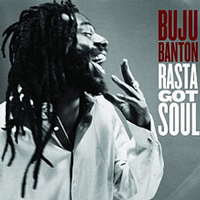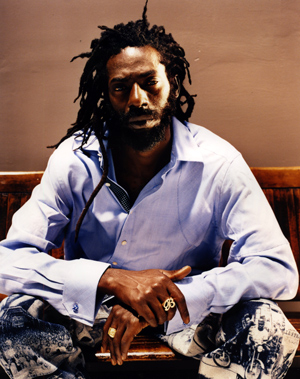A bounty for Buju? Supporters say reggae giant was set up as new lawyer takes case
By Richard B. Muhammad -Editor- | Last updated: Oct 2, 2012 - 8:42:26 AMWhat's your opinion on this article?
“Why dem want to make Buju Banton cry? Is it because of Boom Bye Bye? (Or because I’m) Black and not shy?” -Buju Banton, January 18, 2011

|
Later this month Buju Banton, a leading reggae entertainer and music industry giant, returns to court for resentencing on a gun charge related to a controversial drug trafficking conviction. His new lawyer and supporters say the gun charge, which was thrown out by a federal judge before a court ordered its reinstatement, is as suspect as the conviction. He never had a gun, someone else in the case did. Supporters are also determined to keep fighting for his freedom.
The reggae star’s case would make for entertaining fiction if it was not disturbing fact: On a plane ride from Madrid to Miami, the star has a “chance” encounter with a fellow traveler, who talks of business deals and big profits. Plied with alcohol and perhaps some bravado, Buju engages in conversation. His new friend, Alexander Johnson, is actually a wire wearing DEA informant. Mr. Johnson would eventually be paid $50,000 for his work bringing Buju in and was paid over $3 million in his nefarious work with the DEA.
The 2009 flight led to a hung jury in a first Florida trial but when federal prosecutors took a second shot, Buju was found guilty in June 2011. The charges included conspiracy to possess with the intent to distribute cocaine, possession of a firearm and furtherance of a drug trafficking offense and using a telephone to facilitate a drug trafficking offense. He was sentenced to 10 years.

|
The twist? Buju wasn’t at the location when money was brought to buy drugs, he had no history of drug trafficking or convictions. And, even one DEA agent admitted at trial, that Buju didn’t provide $150,000 a friend showed up with to pay for the drugs and Buju didn’t benefit from the sale.
“This is not right what they are doing is they scarring our young men. This war on drugs is a war on us,” said Aula Sumbry, of Trenton, N.J., who is a member of the Buju Banton Defense Support Committee.
The disaster begins with Buju and a businessman having drinks, talking deals and then telling tall tales, said Mr. Sumbry.
“Buju was like he was just kicking it with somebody who was a nice dude he met on a plane, never suspecting that this person was a trained professional and I have to say snitch. A snitch is someone who is a criminal himself who turns on someone else and tries to implicate them in other crimes,” he said. In the 1960s and 1970s Black organizations had agents come in to do this same kind of thing, added the internet radio host.
“This man was there being paid trying to set Buju up,” he said.
Supporters say Buju avoided the DEA informant once it became evident the talk of drug dealing wasn’t just big talk but actually a plan. But the place when he makes the realization is also the place where the DEA captures him on tape in a warehouse. Buju went to the site expecting to be taken out on a boat but sees likely armed men and cocaine and tries incessantly to get out. He also has no dealings with Mr. Johnson after that night, say supporters. Instead a friend who visits in Miami starts conversations with Mr. Johnson, apparently recruits real partners with real money and tries to do a real deal.
Supporters say even the friend, who was later convicted of drug trafficking and testified against Buju, tells Mr. Johnson that Buju is into music, not coke. Another man convicted, however, says Buju had nothing to do with the deal.
Mr. Johnson, the government employee, however, was convicted in 1993 for distributing cocaine. He also transported large amounts of coke and marijuana between 1984 and 1993, federal authorities admit. They also insist the meeting between Buju and the experienced Colombian drug dealer was a chance encounter. Their contention is crucial because if it can be proved otherwise, Buju becomes a likely victim of government targeting.
Chokwe Lumumba, a Mississippi lawyer with deep roots in the Black struggle, doubts the dreadlocked musician’s meeting with a DEA informant in first class was simply bad luck for Buju, his new client. “I think the government is pretending that it was a chance encounter,” he told The Final Call about two weeks into starting his work. During the recent interview, he was still awaiting court documents as he prepares for trial in Florida and a Nov. 3 appeal to the Supreme Court to have the case overturned. The resentencing on the gun charge is scheduled for Oct. 30.
Government informants don’t usually travel first class for no reason and, if anything, Buju was approached about selling drugs, stressed Atty. Lumumba. It sounds like entrapment because nothing shows Buju had any predisposition to buy or sell drugs, he continued. And, the lawyer added, it’s not clear there was a conversation about drugs as far as Buju was concerned.
“Wherever there is entrapment and trying to arrange entrapment there is always the danger of fabrication,” said Mr. Lumumba.
“It became very apparent that the government’s case was based on the snitch,” said writer Chris Sweeney, staff writer for the Miami-based New Times, an alternative weekly newspaper, who covered the second trial. The shouting federal prosecutor was like a scene out of Law and Order as the jury was bombarded with videos of “a drunken Buju saying a few bad things,” he recalled.
But, writer Sweeney said, the most important discovery wasn’t heard at the trial. In an unrelated case where the same informant set up a cancer stricken man who plead guilty to drug crimes, the judge in that case condemned Mr. Johnson as not trustworthy and essentially blasted the DEA for using him, said Mr. Sweeney.
Mr. Johnson was also facing a $200,000 IRS tax bill at the time he started working on Buju, so there was a clear financial incentive for the informant, he pointed out.
Carolyn Cooper is a member of the defense committee and professor at the University of the West Indies in Kingston, Jamaica. She teaches literature and popular culture, Reggae Poetry, and Buju is one of the writers studied in her course. She is convinced he is innocent. Buju has come a long way from his days as a brash young artist who recited sexually explicit dancehall lyrics and has evolved into a conscious Rasta expressing thoughts about Pan Africanism and Marcus Garvey, she said.
But one of the songs Buju, 39, is known for, “Boom Boom Bye Bye,” has resulted in a long running feud with the gay community. He was a teen when he penned the song in reaction to the rape of a boy by a man. That longtime feud led to many in Jamaica and fans suspecting that the Gay Mafia, powerful entertainment figures, were involved in the targeting him.
Dr. Cooper admits such talk exists, but is more concerned about the targeting of a giant on Jamaica’s cultural scene. The four-time Grammy Award nominee came to her campus and discussed his album, “Rasta Got Soul” in 2009. It represented connections to reggae and soul music, outreach to Black America as well as suggests Rasta music is soulful music of the spirit and not just the body, she said.
His case, she said, remains important for Jamaicans, but the circumstances around his conviction may be something that everyone should think about.
INSIDE STORIES AND REVIEWS
-
-
About Harriett ... and the Negro Hollywood Road Show
By Rabiah Muhammad, Guest Columnist » Full Story -
Skepticism greets Jay-Z, NFL talk of inspiring change
By Bryan 18X Crawford and Richard B. Muhammad The Final Call Newspaper @TheFinalCall » Full Story -
The painful problem of Black girls and suicide
By Charlene Muhammad -National Correspondent- » Full Story -
Exploitation of Innocence - Report: Perceptions, policies hurting Black girls
By Charlene Muhammad -National Correspondent- » Full Story -
Big Ballin: Big ideas fuel a father’s Big Baller Brand and brash business sense
By Bryan Crawford -Contributing Writer- » Full Story






 Click Here Stay Connected!
Click Here Stay Connected!








